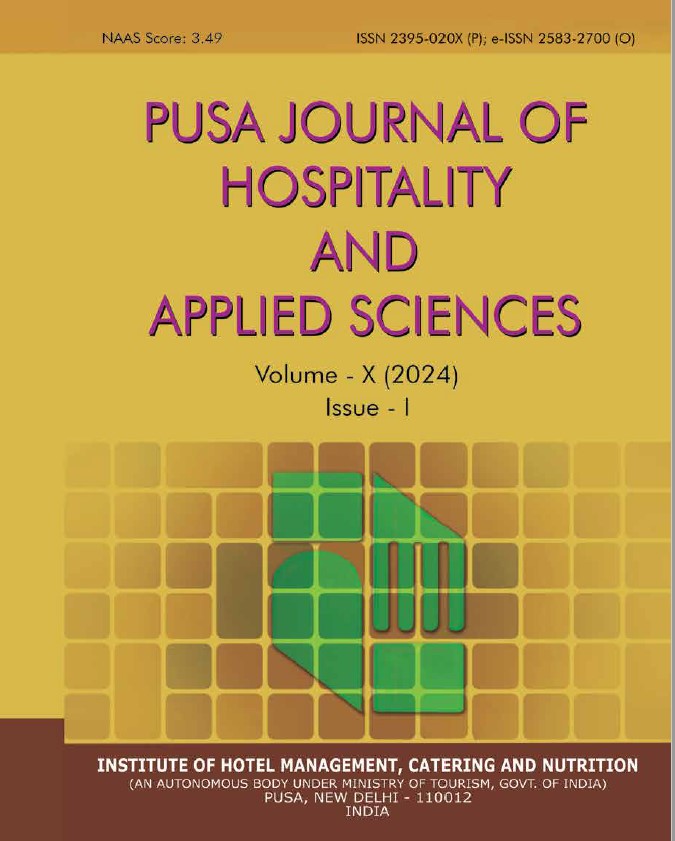Employee Engagement In Organizations: A Study Done On The Operational Employees Of The 5-Star Hotels In Kolkata
DOI:
https://doi.org/10.48165/pjhas.2022.8.2.4Keywords:
Engaged Employee, Organizational Culture, Job Involvement, Empowerment, Hospitality SectorAbstract
Background: Employee engagement is one of the most recent areas of research in management. It is the basis for any organization’s success. The engaged workforce shows its physical and mental commitment, generates energy on the roles to be performed, and gives productivity to a maximum extent which helps in achieving overall business goals. Objective: The major objective of this study was to determine the level of employee engagement of the operational staff. Methodology: The questionnaire was prepared to test the knowledge, employee engagement levels, and organizational culture levels of the employees. Responses were recorded via the online medium from 100 samples (50 males and 50 females), the majority of them were in the age group of 20 to 25 years and were operational employees of 5-star hotels in Kolkata. A 5-point Likert scale was used. Result: The average knowledge score of the sample was 5.45, which indicated great awareness of the concept. The sample achieved an average score of 39.92 in employee engagement, 24.2 in job involvement, 40.59 in empowerment, and 24.78 in cognition, all of which were in the ‘high’ range. The average organizational culture score achieved by the sample was 89.57. Pearson’s correlation coefficient was calculated for the two variables, employee engagement, and organizational culture, and the correlation coefficient was, 0.534 among males and 0.569 among females. The values of the correlation coefficient indicated a positive correlation among the variables. Conclusion: The findings of this study contributed to the knowledge and understanding of the selected factors, which leads to a better understanding of organizational practices that will lead to employee engagement.
References
Abraham, D. S. (2012). Development of Employee Engagement Program on the basis of Employee Satisfaction Survey. Journal of Economic Development, Management, IT, Finance and Marketing, 4(1), 27-37.
Athifah, N. S., Siti, N. A., Bidayatul, A. K., Shamsul, H. R., Azelin, A., & Hazlinda, H. (2016). Linking Work Environment, Team and Co-worker Relationship and Organization Well-being in Increasing Employee Engagement: A Conceptual Perspective. Journal of Business and Social Review in Emerging Economies, II(1).
Bhuvanaiah, T., & Raya, R. P. (2014). Employee Engagement: Key to Organizational Success. SCMS Journal of Indian Management, 61-71.
Danish, R. Q., Ahmad, F., Ramzan, S., & Khan, M. A. (2014). Determinants of Employee Engagement in Service Sector of Pakistan. Universal Journal of Management, II(2), 64-71. doi:10.13189/
ujm.2014.020202
Gouse, B. S. (2016). Evaluation of employee engagement practices in select organizations a comparative study cummins india ltd and greaves cotton pvt ltd. retrieved from Shodhganga: https://
shodhganga.inflibnet.ac.in/handle/10603/130654 6. Gujral, D. K., & Jain, I. (2013). Determinants and Outcomes of Employee Engagement: A Comparative Study in Information Technology (IT) Sector. International Journal of Advanced Research in Management and Social Sciences, II(5), 207-220. 7. Jose, G., & Mampilly, S. R. (2012). Satisfaction with HR Practices and Employee Engagement: A Social Exchange Perspective. Journal of Economics and Behavioral Studies, Vol. 4, No. 7, pp. 423-430. 8. Kahn, W. A. (1990). Psychological Conditions of Personal Engagement and Disengagement at Work. Academy of Management Journal, 33(4), 692-724. 9. Lapoint, P., & Spence, A. L. (2017). Employee Engagement: Generational Differences in the Workforce. Journal of Organizational Psychology Vol. 17(5), 118-128.
M.A, D., & Chika, C. A. (2017). Employee Engagement and Performance of Selected Private Universities in Delta State, Nigeria. Global Journal of Human Resource Management, V(5), 42-53.
Mani, V. (2011). Analysis of Employee Engagement and its Predictors. International Journal of Human Resource Studies ISSN 2162-3058, Vol. 1, No. 2.
Mokaya, D. O., & Kipyegon, M. J. (2014). Determinants of Employee Engagement in the Banking Industry in Kenya; Case of Cooperative Bank. Journal of Human Resources Management and Labour Studies, II(2), 187-200.
Zopiatis, A., Constanti, P., & Theocharus, A. L. (2014). Job Involvement, Commitment, Satisfaction & Turnover: Evidence from Hotel Employees in Cyprus. Tourism Management 41, 129-140.




